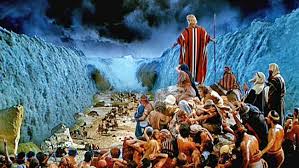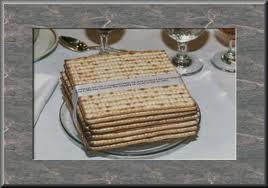Interpreting the Bible Literally and Eating Unleavened Bread for 7-Days?
Feast of Unleavened Bread–Thus Saith the LORD!
As is my typical custom during this time of the Biblical Calendar year, i read and re-read Torah’s account and instructions regarding the Passover.
What I especially enjoy doing, though, is reading entire passages of Torah surrounding Passover (e.g., the entire chapter of Exodus 12 and 16, etc.) through the lenses of various translations. I have found that most, if not all, of the mainstream, authorized translations (whatever that truly means) are in sync with one another. Thus, there is little to no variation in the rending of the various aspects of Passover and Unleavened Bread, from one translations to the next.
I came to the passage of Torah where Abba instructed us to eat Unleavened Bread for 7-days (Exodus 12:15; 13:6,7; 23:15; 34:18; Num. 28:17; and Deut. 16:3). Regardless what translation I would use to read these specific passages, the instruction from Abba Father remained unequivocal: we are to eat unleavened bread during this 7-day observance, period.
Taking into account the teachings of some of our more conservative Torah and Bible teachers, a literal read of Scripture is always preferred and considered wise and safe than an allegorical or mystical or whatever, read of Scripture. One Torah teacher–who I fully respect in terms of him as a person and his ministry/teaching–in his Discipleship 101 course teaches that a literal read of Scripture is always preferred over any other method of interpretation.
I have always leaned towards a literal read and interpretation of the Holy Writ. However, as I delve deeper and deeper into Biblical studies and am more and more exposed to various teachings from other Torah-centered teachers, I’m finding that a full literal read and interpretation of Scripture may not always be the wisest course of study to take.
Literal Interpretation
By the way, a literal interpretation or read of Scripture is simply taking any Scriptural passage of interest and assuming an interpretatin or understanding of that passage as it is written (literally that is). The problem with relying solely upon a literal intepretation or understanding of Scripture is that, when one embarks upon such a method of interpretation, they will invariably run into passages where the literal interpretation is risky at best. (For example, if one’s eye offends one, pluck it out: thus one should literally gouge out his or her eye if it causes them to stumble? Not likely the optimal thing to do when there are other options available to one with an erring eye.)
On the other hand, an allegorical interpretation or read of Scripture assumes a great deal more liberty in one’s understanding of the passage in question. When one chooses to read Scripture from a less than literal sense (e.g., allegorical or mystical), one’s interpretation is left up to one’s unique worldview, which of course, is shaped by a great number of things, including culture and religion, just to name a couple things. The problem with taking on a less than literal interpretation of Scripture is that there is no one true interpretation: any interpretation or understanding of any passage of Scripture is highly subject to so many variables, and thus, such a method is often not a reliable means of interpreting or understanding the Holy Writ.
Eat Unleavened Bread 7-Days says Yahuah our Elohim
Take for instance this passage where Abba instructed us to consume Unleavened Bread for 7-days. How many teachings have you come across where we were instructed to consume just unleavened bread and nothing more? For that matter, assuming a less severe read of these passages, how many teachings have you come across where we are taught to actually consume unleavened bread each of the 7-days of the feast of unleavened bread. And if so, are we actually carrying through with such understanding?
A Question of a Literal Translation or Just an Ideal?
I entered into this Faith Community through two of the Church of God splinter groups. It was here where I became indoctrinated (for lack of a better word) into the practice of buying a massive size box of matzah for the family and consuming matzah each day during the 7-day Feast cycle, and I to this day, continue to practice this without hesitation.
Neverthess, I still come back to this command to eat unleavened bread for 7-days: do we eat unleavened bread as our sole source of sustenance during this 7-day period or do we simply augment our diets with unleavened bread throughout the 7-day feast cycle? I’m inclined to say the latter, but I still wonder about the former. There seems to be no question that we subsisted solely upon leaven for 7-days on our journey toward Mount Sinai. Did Father intend for that application to fade away under the renewed covenant in Yeshua Messiah, or to remain as a lesson and Faith building tool? Most of us continue to abstain from any food on Atonement; why then do we presume that eat unleavened bread 7-days does not mean eat unleavened bread 7-days? Curious situation.

But…But…But!
This is where I start to really reflect and think about what Abba was trying to get across to us during our journey from Goshen to Sinai. Indeed, all indications are that we subsisted during this 7-day jaunt across the desert solely upon unleavened bread (and I’m assuming water as well). Clearly, our abrupt exodus out of Egypt necessitated, in great part, our use of unleavened bread. Yet, there was obviously a greater lesson to be had in this subsistence on unleavened bread for 7-days.
I happened upon a Facebook post this morning where a wise brother in our Faith Community, summed up this very thing: that of having our souls brought into strick obedience to Abba’s instructions, even to the point of our subsistence on unleavened bread. We provided through Abba’s providence, unleavened bread for our sustenance. However, at the end of the 7-days subsisting on unleavened bread, Father provided us bread (i.e., mannah) that was not made by man.
Literal Read or What?
Obviously, Father intended that we eat unleavened bread for 7-days as we transversed the Sinai desert; the fulness of that intention I believe must be fleshed out if we are to truly understand and observe Passover/Unleavened Bread to its fullest purpose.
As much as I am a proponent for a rational interepretation and understanding of Scripture (for the most part), I believe there are some passages of the Holy Writ where we should actually take what Father says literally. In this case, I would venture to say that maybe–just maybe–subsisting on just unleavened bread for the entirety of 7-days might be something to seriously consider if we are interested in manifesting our profession of Faith into action.
What mysteries and spiritual growth opportunities await us if we were to simply step out in Faith and eat just unleavened bread? I don’t know. In this day of hip-hop Christianity and declining Christian Church rolls, one has to to ask: what separates us from them? Sure, we observe the 7-Feasts of Yahuah; we keep the Sabbath; we don’t eat pork; and we abhor Christmas and Easter. So what? We’ve shown that we can be obedient in a few areas. But what about the weightier aspects of Torah as Master suggested? What about the exploits that Master and His disciples displayed and experienced? Why is our Faith Community lacking in so many areas? Why has our loved waxed cold?
Maybe I’m making a moutain out of a mole hill, or am I? Just maybe, next year this time, I’ll put this Torah commandment to a literal test and see where it leads me. Couldn’t hurt–apart from hunger pains and eventually becoming tired of eating matzah.
Faithfully
Rod



0 Comments